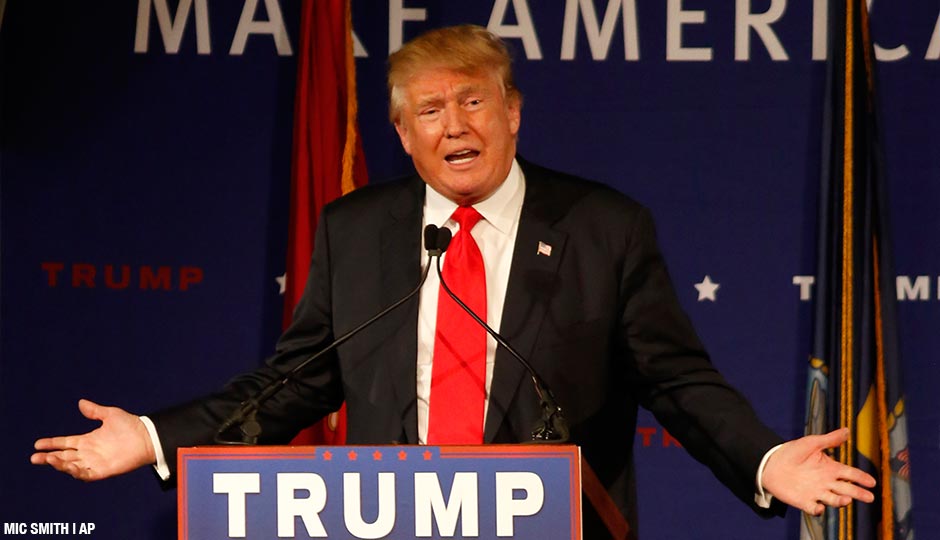Silicon Valley Calls to Secede Bar Progress

President-elect Donald Trump, speaks during a rally coinciding with Pearl Harbor Day at Patriots Point aboard the aircraft carrier USS Yorktown in Mt. Pleasant, S.C., Monday, Dec. 7, 2015.
Donald Trump secured the presidency on Tuesday evening, and Silicon Valley’s response was to call for a “Calexit” — California’s secession from the United States in Brexit fashion.
Philly’s own Darren Hill, the CEO of WebLinc, has even devised an exit strategy for his employees to move to Canada and work out of their Vancouver office should they wish to leave.
Tech is often revered as the industry that will save the world from its ills, the vehicle that will dismantle old, tired systems. Biotech and edtech firms across Philly, for example, search for solutions to our biggest challenges every day. When it comes to digital tech, it’s moved social movements along: Protesters in the Arab Spring six years ago organized through tweets, and just last night the world watched America’s anti-Trump protests live on Facebook.
But there’s a grave disconnect here. When presented with fight or flight, these tech leaders have chosen to put flight on the table. How can the tech community bill itself as a disruption, or as the way to the future, if they present running away as an actual option?
Under Silicon Valley’s “New California” plan, California’s secession would present a “challenge to the system”: Other states would have to vote whether California, the world’s sixth-largest economy, could secede. “Trump voters might actually approve California becoming its own republic. That’s an interesting interplay that I don’t think could happen at any other time. And that should scare everyone,” Shervin Pishervar, the mastermind behind the plan, told Fusion. A venture capitalist, Pishevar, has invested in companies like Airbnb, Uber and Philly-started Warby Parker.
Hill’s exit plan would allow disenfranchised WebLinc employees to relocate to our neighbor up north.
“We’re not forcing anyone to go,” said Hill, who’s a registered Republican and who started WebLinc in Philadelphia in the 1990s. “But because of Trump, people feel they aren’t wanted here. They feel this isn’t their country. We can accommodate them in another country.”
He added: “I’m not leaving, but if a gay employee of mine wants to leave because she’s uncomfortable, she can go.”
Though Hill means well with his plan, his strategy and the desire of Silicon Valley’s elite to secede expose a deep chasm between the tech community and the people who benefit from tech’s social solutions the most.
The results of the election blew the lid off of the country’s large, growing faction of citizens motivated by a Trump-licensed animus. But the hatred that motivates this group exists everywhere — in California and Canada, too. So how exactly will transporting employees do away with a system of hate that is widespread? How exactly will it bring marginalized groups peace of mind?
Tech, though transparent about it, already has low numbers of women and people of color in its ranks, and signaling a pathway out for these groups furthers the idea that they don’t have a place here. While it’s not easy to withstand the burden of Trump’s many phobias and isms, it may be even harder to walk away from the country that you call home. Separatism is exactly what Trump supporters have advocated for, telling protesters to just leave the country if they’re dissatisfied. Hill’s desire is to make minority groups feel comfortable in the wake of a Trump presidency, but discomfort has been a constant for people of color longer before Trump ran for president. Secession and separatism would ultimately have a greater negative impact on communities of color, the places where tech is supposed to save urban youth.
But Hill doesn’t see a way to fight Trump, the president-elect who’s vowed to initiate anti-trust action against Comcast, Amazon and AT&T’s merger with Time Warner and erode the relationship tech has forged with the government under Obama’s administration; he might also force Apple to make its products at home and he’ll likely work to curtail contributions from immigrant entrepreneurs.
“I don’t know what there is to do. I think we’ve been fighting for a long time, and we just got the most racist president ever,” Hill said. “The fight was lost, and we have four years to deal with it.”
Some Philly tech and business leaders see a way forward.
“The fight doesn’t just stop because Trump came in,” said Tracey Welson-Rossman, the founder of TechGirlz, who said the election results were a wakeup call and jolt to keep fighting to get more women in tech. “The Philly tech community is civic-minded, and we need to focus on how tech leaders can be part of positive action and dialogue.”
To Boomi founder and PSL chair Rick Nucci, “New California” reveals Silicon Valley’s tendency to operate in an echo chamber. “[They] spend too much time talking to each other and not enough time talking to the rest of the country.”
Serial tech CEO Bob Moul took to Twitter to urge Philadelphians that there’s more work to get done:
no matter what happens today, comfort in knowing the real work of building this country happens in our cities/neighborhoods – not in DC
— Bob Moul (@bobmoul) November 8, 2016
said this yesterday. It's time to get to work. #Philly can lead the way. https://t.co/BttXVV2SDx
— Bob Moul (@bobmoul) November 9, 2016
1/ for example, excited to co-chair task force on tech workforce dev in #Philly w/ the @EconomyLeague. tech driving 25% new jobs in region
— Bob Moul (@bobmoul) November 9, 2016
2/ an oppty to look at how we make that growth inclusive of all Philadelphians and create paths to employment
— Bob Moul (@bobmoul) November 9, 2016
Dear tech: There’s no quick hack to eliminate America’s deepest ills or make them easier.
Follow @fabiolacineas on Twitter.


